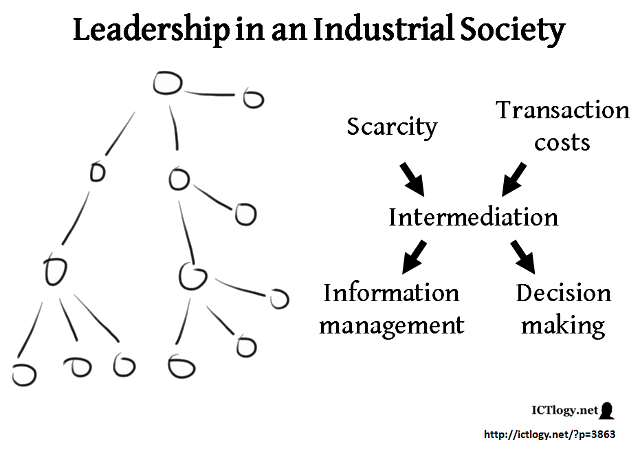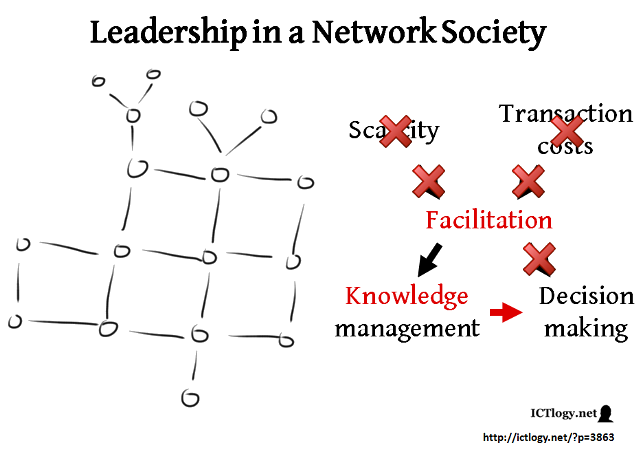When we speak about leadership in a digital age, we use to list plenty of “new” skills that the “new” leader should have, namely: problem solving, critical thinking, team-working, etc. While I might share this or any other combination of skills that one may make up, the problem I find with this approach is that it focusses too much on the consequences and not on the cause, on trying to deal with the resulting scenario of the deep changes we are witnessing instead of trying to understand the causes behind that very same change. In other words, most lists of 21st Century Skills are symptomatic when they should be systemic.
In the following interview (in Spanish) for The Project I tried to depict what is a leader in a digital era and, by construction, what is an “Enterprise 2.0” — a term with which I do not feel very comfortable, but that everybody seems to understand (which is what matters).
The baseline is that we have succeeded in digitizing information and communications, with two major consequences: the end of scarcity and transaction costs, and the substitution of human mind-work by machines. In this context, two main strategies arise:
- The substitution of hierarchical structures by horizontal networks, which imply being able to work very differently, enabling connections.
- The need to master digital skills — a complex set of — as the new landscape is digital.
Networks
In an industrial society, goods are scarce (apples are not infinite, nor are sheep or any other resource) and working with them requires transaction costs.
Hierarchies and intermediaries used to be efficient and effective ways to cut down transaction costs while working with scarce goods. Information — which was embedded in physical supports as books or brains, both of them scarce — was also scarce and costly to handle. Thus, decision making had to be centralized: only the one on top would be able to have all the information necessary to make an informed decision.

When we digitize our inputs (information), the way we apply labour (knowledge), capital (computers), and our output (information and/or knowledge), goods become non-scarce (as material goods used to be) and dealing with them (storage, “handling”, transformation, distribution, etc.) becomes costless.
The hierarchical architecture becomes now a burden: information has to artificially circulate along the chain of command, infringing an added cost in matters of time and, sometimes, matter. When information is abundant and transaction costs are few, networks are more effective and efficient than hierarchies. That is a fact.

In a digital society, the good leader is the one that enables the network to be, to run smoothly, to create connections between all the nodes, to shift the process of decision making to the nearest and most appropriate node, more likely to be much more knowledgeable about a specific matter than any other node in the network.
Digital skills
Not only understanding that the network is the new architecture is what is needed, but also being able to live in it. And as networks are boosted by digital technologies, a collection of digital competences apply.
An explanation of such a collection can be found at Towards a comprehensive definition of digital skills. I will just list them here:
- Technological Literacy: HOW
- Informational Literacy: WHAT
- Media Literacy: WHERE
- Digital Presence: WHO
- e-Awareness: WHY
When asked for an example where all these skills can be put into practice, I like to cite Analyzing digital literacy with a single simple tweet, where each and every conception of digital literacy can be explored by using a message on Twitter.
Social networking sites
A typical question that usually comes at this point is whether firms should be on social networking sites. In an interview (also in Spanish) entitled Redes sociales: ¿oportunidad u obligación? (Social networking sites: opportunity or obligation?) I talked about this.
The main points of the interview are the following four:
- Living in the social networking sites is both a problem and a requisite of the “new times”. On the one hand, as social animals, we have to acknowledge that social networking sites are boosting our social potential: committing with a cause, hanging out with friends or engaging in collaborative work are much more easy when gone digital. On the other hand, if we are knowledge workers (and we increasingly are), social networking sites are tools which usage we should master.
- Digital technologies are becoming general purpose technologies. This means that each and every aspect of our lives will be affected and transformed by digital technologies. And now that we just added the “social layer” onto the Internet, we will never more be able to tell a social networking site from the “rest of” the Internet and vice versa.
- This is a change of era, not a collection of small changes. Institutions will be radically transformed as will be the concept of citizen (or worker, in the context of businesses).
- Thus, we have to acknowledge and understand those changes. And we have to acquire the necessary (digital) skills to deal with the new scenario that is unfolding before our eyes.
If you need to cite this article in a formal way (i.e. for bibliographical purposes) I dare suggest:
Peña-López, I. (2011) “Leadership in a digital age: networks, digital competence and social networks” In ICTlogy,
#98, November 2011. Barcelona: ICTlogy.
Retrieved month dd, yyyy from
https://ictlogy.net/review/?p=3863
Previous post: Announcement: Call for papers for the 8th International Conference on Internet Law & Politics
Next post: Joan Balcells, Ana SofÃa Cardenal: The influence of the Internet on voting behaviour
4 Comments to “Leadership in a digital age: networks, digital competence and social networks” »
 RSS feed for comments on this post.
TrackBack URI
RSS feed for comments on this post.
TrackBack URI


Pingback: ICTlogy » ICT4D Blog » Leadership in a digital age: networks, digital competence and social networks « prXs
Pingback: Leadership by leadmap - Pearltrees
Pingback: Leadership in a digital age « zgenesis
Pingback: ICTlogy » SociedadRed » Comentario al informe La Sociedad de la Información en España 2012 de Fundación Telefónica